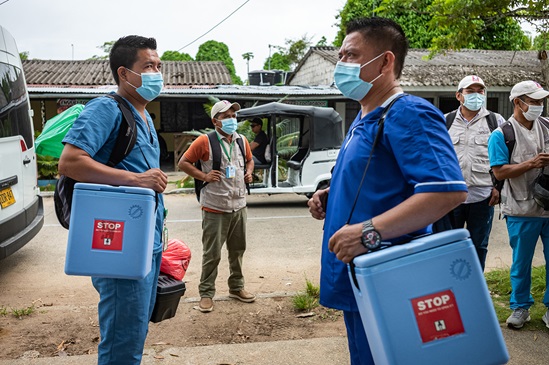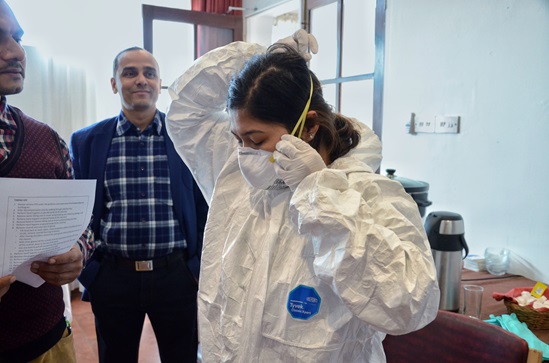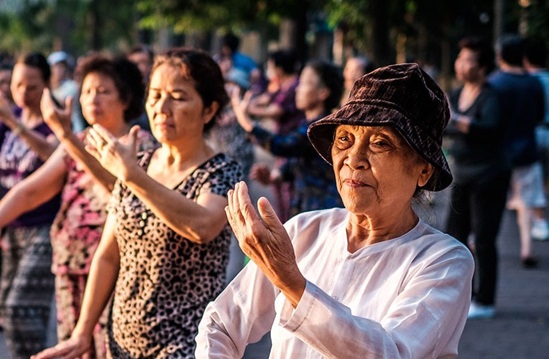.tmb-768v.jpg?sfvrsn=a962626e_2)
Canada
Partner in global health
This content was last updated on 13 May 2022
A meeting of minds to deliver health for all
Canada and WHO share a commitment to a world where all people can enjoy the highest attainable standards of mental and physical health.
Canada has been a steadfast supporter of WHO since its creation in 1948 and plays an active leadership role, both in the Americas region and in many areas of WHO’s global work. This includes contributing support and expertise to health emergency response efforts such as the COVID-19 pandemic, developing a vaccine for Ebola, championing polio eradication, and advancing global health security. Support is also provided through collaborating centres working and advancing joint priorities such as environmental health and non-communicable diseases; through advances in policy, through leadership actions (co-hosting the Global Diabetes Summit in 2021), or supporting the WHO Framework Convention on Tobacco Control and implementing it nationally.
Through its Feminist International Assistance Policy, Canada is committed to advancing gender equality and the empowerment of women and girls, in all their diversity, partnering with WHO to advance these objectives. This includes equity-based approaches to health systems strengthening and primary health care, and by closing gaps in sexual and reproductive health and rights. Canada strongly champions these issues within WHO governing bodies.
Canada’s commitment to WHO includes working together to ensure it is an effective, efficient, relevant, transparent, accountable, and well-governed institution, whose actions and recommendations are guided by Member States and the best available science and evidence. WHO helps achieve globally what no single country can do alone.
A contributor and leader in the Americas

Canada is a strong supporter of the Pan American Health Organization (PAHO), WHO’s Regional Office for the Americas. Canada is the third largest contributor of assessed contributions and among the leading providers of voluntary contributions to PAHO, which reflects a longstanding partnership to deliver on health for all throughout the Americas Region. In addition to working with PAHO to address antimicrobial resistance; strengthen the capacity of National Regulatory Authorities (NRAs); support health sector response capacities for health emergencies and disasters; and, address the health impacts of climate change, Canada also supported the partnership between PAHO and the Caribbean Public Health Agency (CARPHA) on the pandemic response.
Working Together to Keep the World Healthy and Safe

A nurse learning how to wear a hazmat suit at a WCO Nepal workshop; S. G. Amatya
Biosafety/biosecurity and Global Health Security
WHO and Canada collaborate to prevent the proliferation of biological and other weapons of mass destruction (WMD) and related materials, and to enhance collaboration between the health and security sectors to mitigate all manner of global biological threats, whether natural, accidental or deliberate.
Canada’s Weapons Threats Reduction Program (WTRP) has contributed more than Can$ 40 million to this work, resulting in an initiative to enhance biosafety and biosecurity for Ebola samples in Sierra Leone, a newly built 24/7 global event-based surveillance system and a regularized WHO’s Health Security Interface (HSI) Secretariat as well as increased capacity and capabilities in this area.
Healthy Lives and Wellbeing
Canada is a strong supporter of WHO’s work to ensure healthy lives and well-being for all, at all ages; and of Health Systems Strengthening through Primary Health Care investment
Healthy ageing
Since 2005, Canada has provided funding and in-kind support to WHO towards the Age-Friendly model, guidelines and national communities programs and the creation of age-friendly environments around the world. Canada also supports WHO work under the UN Decade of Healthy Ageing by including the voices of older people amongst others.
The Public Health Agency of Canada (for Canada), and Municipalité amie des aînés, on behalf of Québec, are affiliates and support work to advance knowledge and action on age-friendly environments, as members of the WHO Global Network for Age-Friendly Cities and Communities, established in 2010.


Maternal, newborn and child health
Since 2012, Canada has supported the WHO-hosted Partnership for Maternal, Newborn and Child Health, which provides a platform for global health stakeholders to align objectives, strategies and resources, and agree on interventions to improve maternal, newborn, child and adolescent health to reach the 2030 Global Strategy targets. This is a platform where a diverse group of health sector partners achieve more by coming together, sharing expertise and experience, aligning and focusing on where they can have the greatest impact in advancing the 2030 Agenda.
Prioritizing mental and neurological health
Canada and WHO are aligned in their vision to ensure that all people achieve the highest standard of mental health and wellbeing, and support WHO’s flagship programme established in WHO’s 13th General Programme of Work.
Canada also works with WHO to develop an evidence-based package, Helping Adolescents Thrive (HAT), to tackle suicide, and strengthen countries’ abilities to promote adolescent mental health and wellbeing, prevent mental disorders and reduce risk behaviors and self-harm.
People living with dementia have been disproportionately impacted by the COVID-19 pandemic. Data shows that women are more likely than men to be diagnosed with dementia and that most caregivers for people living with dementia are women. Canada is a supporter of WHO’s Global Dementia Observatory (GDO) and related knowledge exchange platform facilitate knowledge- and data- sharing and fosters mutual learning between Member States, contributing WHO’s Global Action Plan on the Public Health Response to Dementia.
.tmb-549v.png?Culture=en&sfvrsn=3606ff3_3)
A Common Vision for Health Equity and the Determinants of Health

Ending violence
Canada recognizes violence against women and children as serious public health problems and human rights violations and abuses, and has supported WHO’s work on violence and injury prevention for the past 15 years
Canada was a key supporter of the Global Plan of Action on health systems response to violence against women and children, adopted by the World Health Assembly in 2016. In October 2017, the Government of Canada on behalf of WHO hosted the 8th Milestones of a Global Campaign for Violence Prevention Meeting, carrying forward this work across the AFRO and EMRO regions.
Canada also supports WHO’s Violence Prevention Information System (Violence Info), which collates published scientific information on the main types of interpersonal violence.
Environment and health
Canada has a long-standing history of collaboration with WHO on environmental health, including work on chemicals management, support for the WHO’s Urban Health Initiative, partnership on health and climate change as well as technical support and cooperation in areas such as improving drinking water and recreational water quality, as well as assessing potential health effects of radiation exposure.

Urban green and blue spaces
Collaborating Centres
Canada hosts more than 30 active WHO Collaborating Centres, providing expertise on a wide range of topics.
The Government of Canada hosts Collaborating Centres on Non-Communicable Disease (NCD) Policy; Biosafety and Biosecurity; Environmental Health; and Standardization and Evaluation of Biologics.
Together with Collaborating Centers hosted by other Canadian institutions, Canada provides expertise also on areas related to addiction and mental health, health workforce planning and research, patient safety, tuberculosis research and more.




.tmb-549v.jpg?Culture=en&sfvrsn=e2805019_2)
